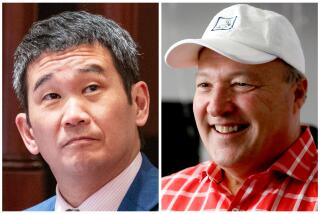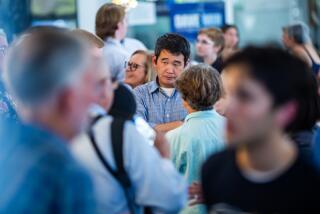Many Strikes but He’s Never Out in the Old Baugh Game
- Share via
If you live in Orange County and have a great memory, you’ve probably heard of the Scott Baugh case. It’s been around so long that when it began, Tommy Lasorda was still managing the Dodgers. Orange County still had oranges.
Lasorda and the oranges are gone, but not the Baugh case.
But at least it’s out of Orange County.
Last week, it got put in a Fed Ex package and took a trip up to Sacramento, where it wound up in the lap of new state Atty. Gen. Bill Lockyer. He welcomed it as one would a ransom note.
Baugh was the young (then) Republican assemblyman indicted for his alleged role in the November 1995 election in which he filled out the term of recall target Doris Allen. Republican operatives, some of whom long ago pleaded guilty to various charges, tried to grease Baugh’s election by planting a decoy Democrat in the Baugh race, hoping she would draw votes from a more prominent Democrat in the race. She turned out to be an old friend of a gentleman named Scott Baugh.
It sounds complicated, but it wasn’t. The Republicans wanted Allen’s seat so they could control the Assembly.
A local grand jury indicted Baugh in 1996, and here we are in 1999. Since then, the case has been before a few judges and two district attorneys and now belongs to the state.
The future timeline may look something like this:
January 1999: With Baugh’s lawyers pressing for a quick resolution, Lockyer vows to make his decision “any minute now.”
March 2000: Citing “recent cutbacks in my office,” Lockyer says he doesn’t have the staff to handle the Baugh matter and sends it to the FPPC. Baugh announces he’s running for the state Senate.
November 2000: The FPPC shuts down for lack of funding and sends all cases back to the attorney general’s office. Baugh is elected to the state Senate.
February 2002: Lockyer reviews the Baugh matter and decides “against further prosecution at this time.” Former Orange County prosecutor Mike Capizzi, who sought the original indictment against Baugh, calls Lockyer’s decision “an indictment of justice” and announces his candidacy for state attorney general. Baugh announces his gubernatorial candidacy.
November 2002: Capizzi swamps Lockyer and vows as his first order of business “to reopen the Scott Baugh case.” Baugh is elected governor in a close race with singer-turned-politician Cher.
April 2003: Ruling that Capizzi’s previous involvement “could skew his objectivity,” a state judge sends the Baugh case back to Orange County.
October 2005: When asked why the Baugh file has languished in his office, Orange County D.A. Todd Spitzer sheepishly explains, “I forgot it was here.”
March 2006: Spitzer sends the Baugh matter to the FPPC in neighboring Nevada, with a request that it be handled “really soon.”
November 2006: The Nevada FPPC finds that Baugh violated a number of campaign disclosure laws and fines him $99.50. Baugh wins his second term as California governor.
October 2015: Baugh, chief justice of the California Supreme Court, announces he’s running for president in 2016.
November 2016: Scott Baugh wins the presidency, defeating U.S. Sen. and former Minnesota Gov. Jesse “The Body” Ventura.
February 2017: Saying he has uncovered “substantial new information,” former Orange County D.A. and California state Atty. Gen. Capizzi asks the U.S. attorney general to look into President Baugh’s activities in his 1995 California assembly race.
August 2017: A three-judge panel names retired federal judge Kenneth Starr, 71, as special prosecutor in the Baugh matter. Starr pledges to be “thorough” in his investigation but refuses to put a time limit on his work.
*
Dana Parsons’ column appears Wednesday, Friday and Sunday. Readers may reach Parsons by calling (714) 966-7821 or by writing to him at the Times Orange County Edition, 1375 Sunflower Ave., Costa Mesa, CA 92626, or by e-mail to dana.parsons@latimes.com
More to Read
Sign up for Essential California
The most important California stories and recommendations in your inbox every morning.
You may occasionally receive promotional content from the Los Angeles Times.













